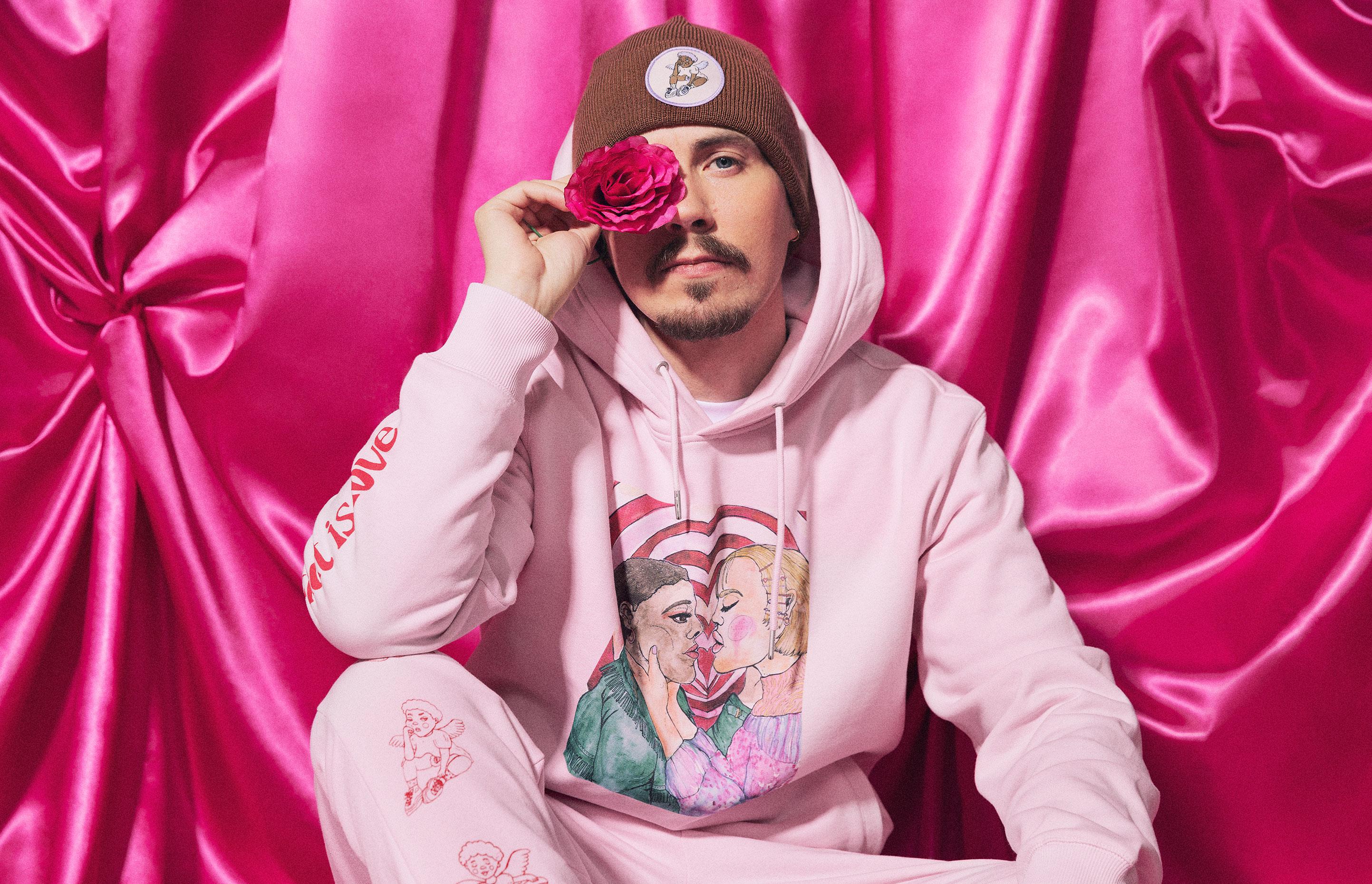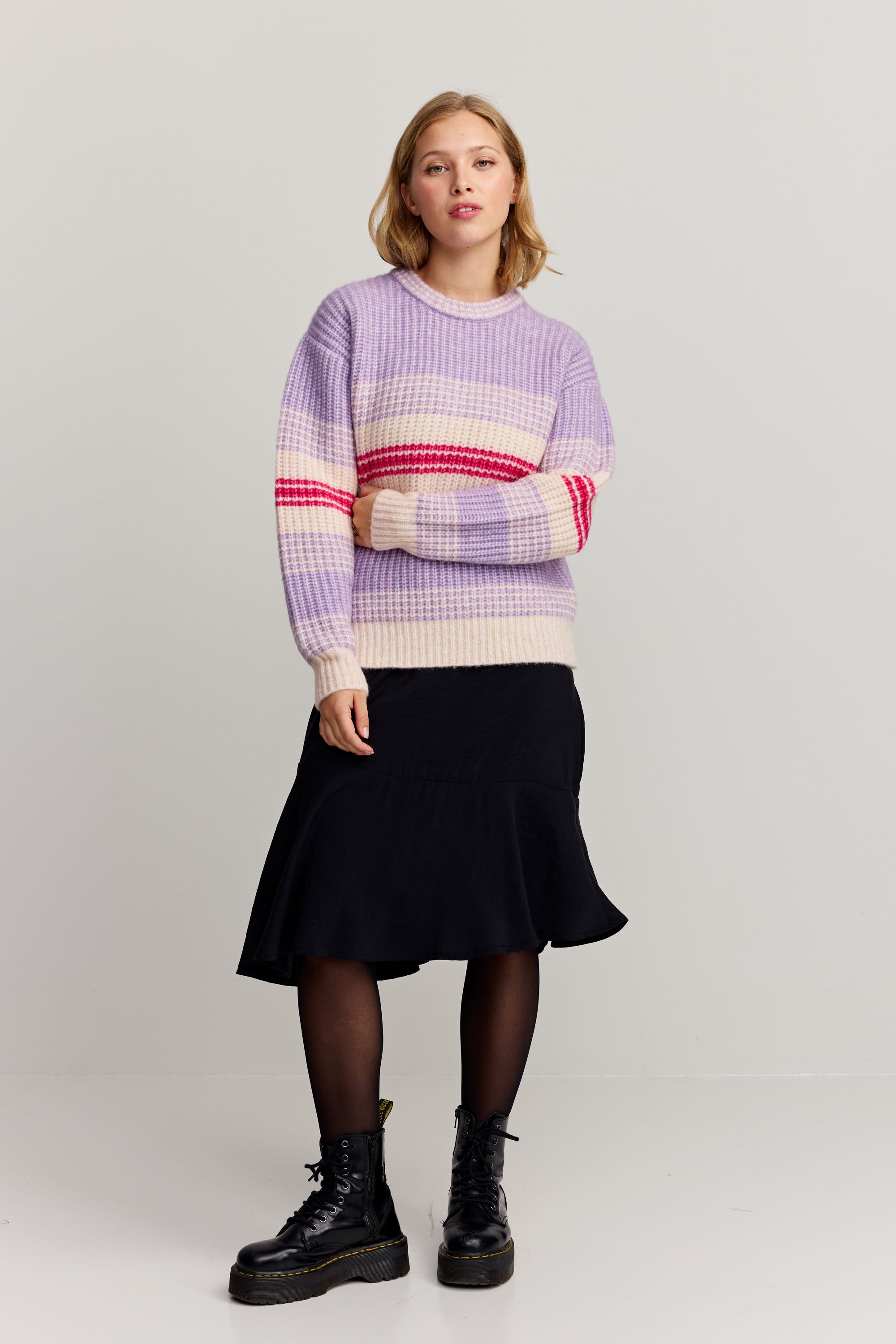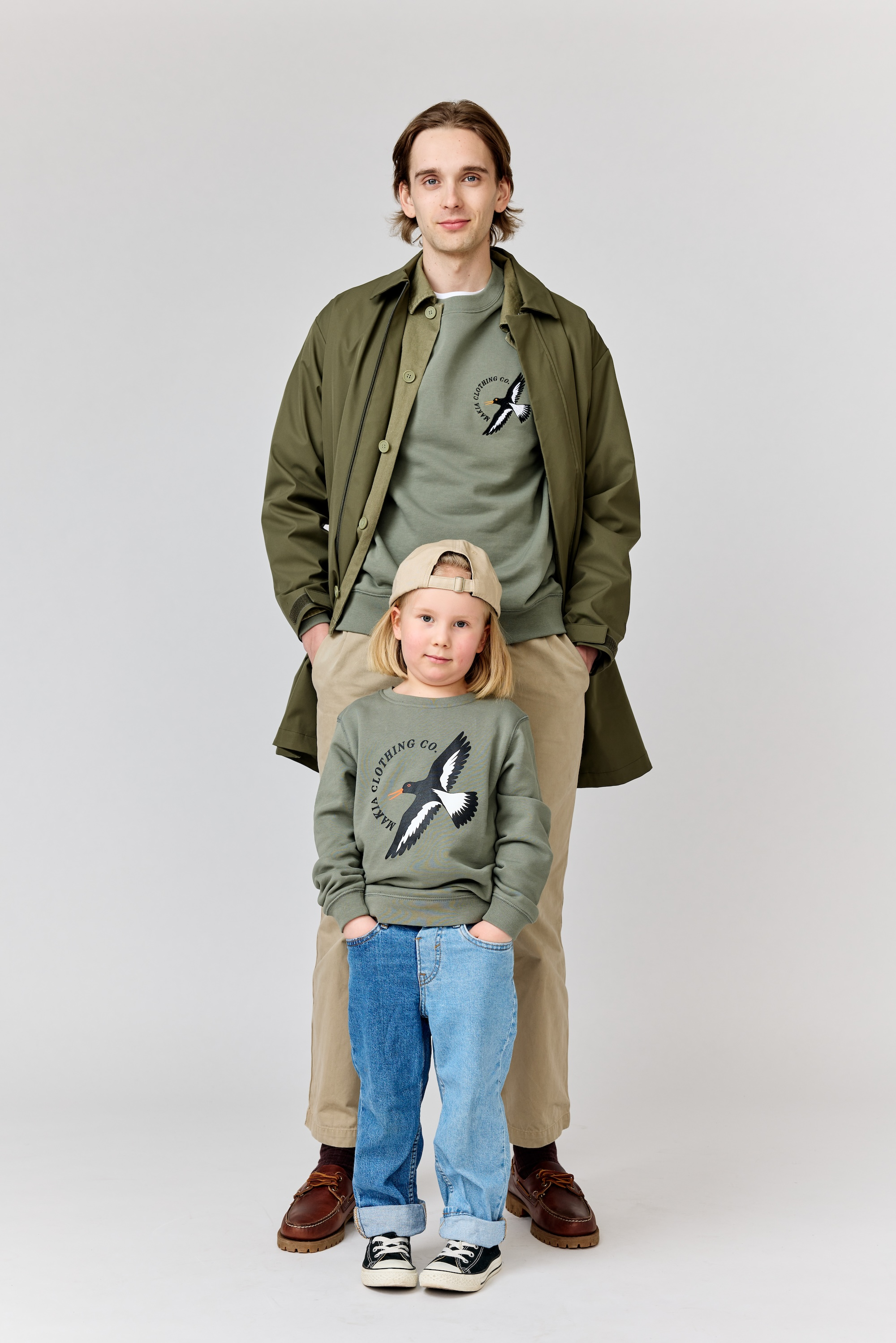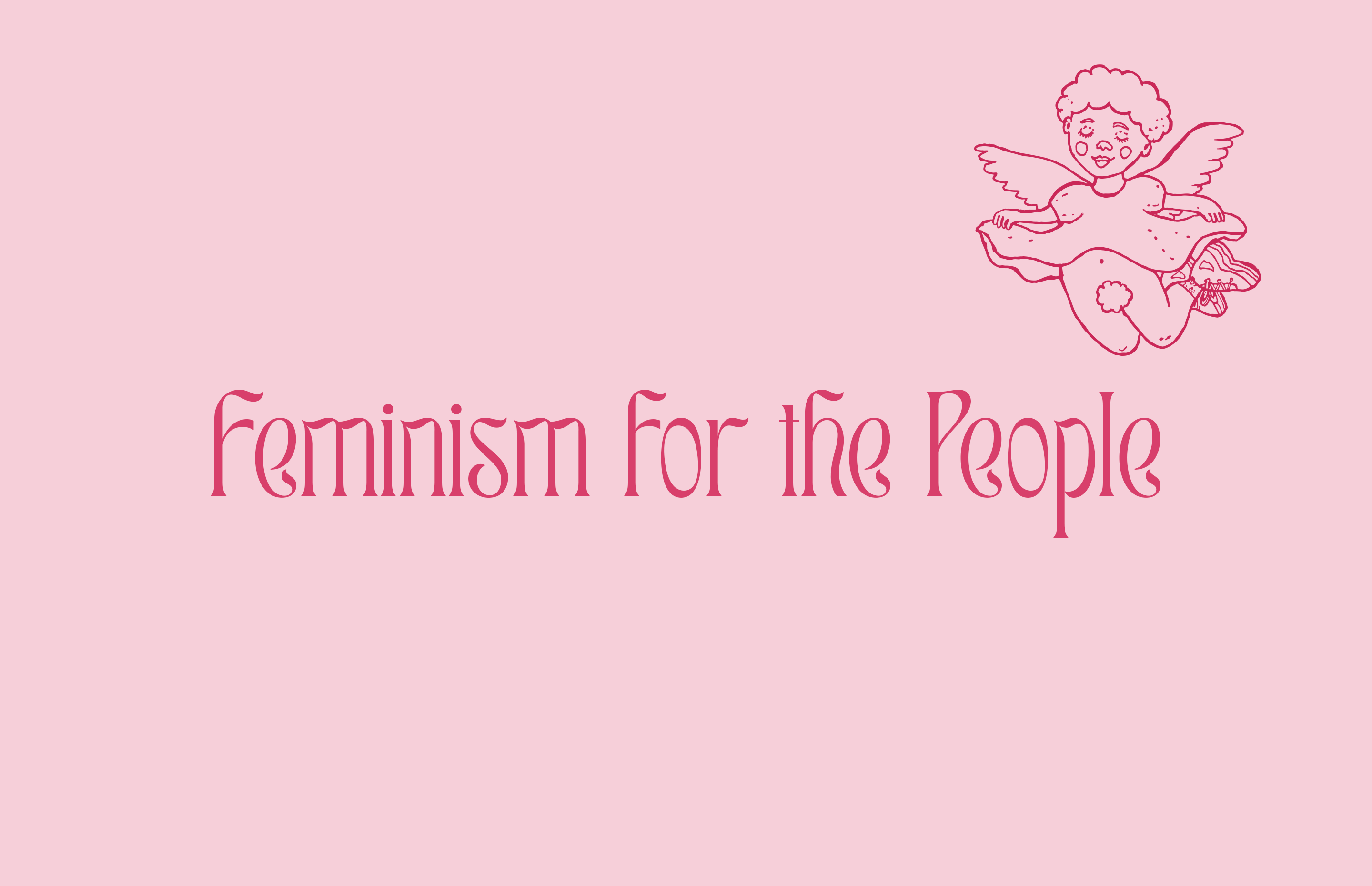
Who made your Tympeät tytöt shirt?
Joint collection of Tympeät tytöt and Makia wants to bring feminism closer to people and the streets. But instead of talking only to the consumers, in such openings it is always important to pay attention to the extent to which the production process conforms to feminist values.
Read the journal in finnish. Lue journal suomeksi.
Throughout the 21st century fashion brands have exploited feminism. Unfortunately, the trend has often forgotten the most important ones: those who make our clothes. The weight of the fashion industry rests on women’s shoulders. There are 75 million garment workers in the world, and 80 percent of them are women between the ages of 18 and 34, majority of whom live in the Global South and work in many ways under insufficient working conditions.
Our current clothing industry is built on an irresponsible base, with little value given to environmental issues or workers’ rights. Fashion is an industry that cannot be fully mechanized, and it still requires a lot of handwork. All clothes are made by a human.
So now let’s take a look at who made these attitude shirts. The information has been gathered from various sources: interviews with Makia and Yototeks (which organizes the entire supply chain), online sources from producers, and websites focusing on responsible fashion and employee rights. Based on this information, I will open the supply chain to you as openly as I can.
Who Made Your Clothes?
Fashion supply chains combine agriculture, manufacturing, technology, and manual handwork. It is challenging to transparent long supply chains, but background work must not be left to the consumer. This article will focus on clothes, which has the most complex supply chain. The tote bags are made from recycled waste in the Jiangsu region of China and printed in Finland, and the beanies’ yarns come from Italy and are knitted in Finland.
Makia’s work with responsibility has long been focused on ecological sustainability, and the next focusing point is social responsibility. However, work on supply chain transparency is still a work in progress, and I did not get answers to all of the questions from Makia because those answers do not yet exist.
Ethical Rules
Let’s start with the fact that all of the subcontractors and partners are committed to follow to Makia’s Code of Conduct (ethical rules), which is based on the Universal Declaration of Human Rights, the UN Principles on Business and Human Rights and ILO’s agreements and recommendations for improving working conditions in the supply chain. De facto this means, for example, that Makia does not accept child labor, forced labor or discrimination, and that partners should provide an adequate livelihood for the worker and family. To that extent, it could be assumed that the working rights will be realized, but beautiful sentences are not enough. So, let’s look further.
Yototeks
Turkish Yototeks is Makia’s first tier partner, who organizes the entire supply chain of Tympeät tytöt clothes. Yototeks is a small family business, run by two women, that has been manufacturing and exporting clothing for over 30 years. The co-operation with Makia has lasted for more than 10 years. The Yototeks’ factory is located in Izmir, Turkey’s third largest city on the coast of the Mediterranean. The company directly employs 33 people, 55% of whom are women and 45% of men, and works with local companies. The factory was last audited according to Makia’s operating instructions in May 2021, and Makia visits the factory annually.

Turkey’s Clothing Industry
Turkey is the world’s 7th largest exporting country in the clothing industry and the field employs a huge number of people. Problems in the clothing industry are generally seen to be found in Asia, but human rights issues are equally presented in other major countries of clothing industry. Several human rights organizations classify Turkey as a high-risk country where human rights are violated and work is not adequately paid (for example, Clean Clothes Campaign). Inflation in Turkey and the energy crisis caused by the corona virus and the Russian invasion are also complicating the situation. However, it would be arrogant to stigmatize the entire Turkish clothing industry as irresponsible: the clothing industry is the second largest industry in the country and contains many different players. Turkey has had a close relationship with the European Union for a long time, with the result that international job standards are ordinary, and many companies are very “western” – if we want to use that word as a synonym for decency. Nor is Europeanness a guarantee to the realization of human rights: for example, Italy and many Eastern European countries, such as Ukraine, are also defined as risk countries in the clothing industry.
Supply Chain
In the Turkish garment industry small and medium-sized factories with a wide subcontractor chains are a norm, and working conditions typically decline down the supply chain. Supply chains often lead to Turkey’s (and Europe’s) cheap backyard, the province of Eastern Anatolia, where many European fast-fashion companies produce their clothes. Approximately 60% of all workers in the country’s garment industry are unregistered, meaning they are left without work safety and the ability to organize and defend themselves. Refugees are in a particularly vulnerable position. Turkey is home to the world’s largest refugee population, and most of them work without employment contracts, accept dangerous working conditions and insufficient wages because there are no other options.
The Makia Code of Conduct states that all partners have to make sure that migrant workers have the same rights as local workers. These rights mean, for example, that all companies must have a written employment contract with each employee. In the 2021 audit and in our discussions Yototeks confirms that all employees throughout the subcontracting chain are official employees and have an employment contract with everyone. Yototeks does not cooperate with fast-fashion companies, and says the reason is the rights of subcontractors, which are often trampled on during the rapidly cycle and heavy price pressure of fast-fashion.
Yototeks says its subcontracting and cooperation chain consists of long-term and local partners. The clothing supply chain for our collection is as follows:
The fabric material is GOTS-certified organic cotton that comes from the United States. The certificate guarantees that the product is made up of at least 70% ecological fibers, in addition to which GOTS demands that the entire supply chain must be ecological: from initial processing to the final product, production, chemicals, water use, waste, packaging and distribution. GOTS also demands social responsibility, e.g., minimum wage, discrimination, and work safety. However, the ecology-focusing GOTS is no guarantee of human rights. Many organizations researching the global impact of business, such as Finnwatch and Fair Trade, have pointed out that GOTS does not control initial cotton producers and, for example, does not take a stand on the forced labor with China’s Uighur minority. But since the cotton in our collection comes from the United States, at least this problem is not found in the background. However, the final product, Tympeät tytöt clothes, does not have a GOTS certificate because the entire supply chain has not purchased the certificate for its own use. The GOTS path for our clothing ends with Aslitex, who makes the fabric.
Yarn & spinning. Cotton is spun into yarn by Karteks Tekstil in Sarıçam, southern Turkey, and or Karafiber Tekstil in Gaziantep. Makia’s data on spinning is still incomplete: large batches of cotton are spun crosswise in different places according to capacity and quality of fiber, and at the moment it is not possible to tell for sure from which spinning batch the yarns do come. But both Karteks and Karafiber are certified in many ways, for example both have GOTS certification (see Karteks and Karafiber).
Fabrics are knitted, dyed, and finished by Asliteks in southwestern Turkey, Denizl. On its website Asliteks emphasizes ecological and social sustainability in all its production. To confirm this, the company has many different certifications such as GOTS, Higg -certificates indicating both ecological sustainability and employee rights, and Ökötex which verifies the safety of products and production processes. Asliteks’ various ambitious projects in terms of social responsibility and ecological sustainability can be checked e.g. from Instagram.
Quality control and cutting. Fabrics are cut by Yototeks, Izmir, Turkey.
Sewing. College clothes are sewn by Fahriy Gurson in Izmir and t-shirts by Mustafa Ozdemir in Izmir.
Print production. Digital prints are printed by Desen Empirme in Izmir and Screen Prints by Ensa Basque, also in Izmir.
Finishing and packaging: Sevda Dast
Product design. I did the design work in Finland together with Makia’s women’s lead designer Elina Lappalainen.
Working Hours
There are no official limits on the working hours per week in Turkey, but according to EU’s regulations on working time, the Makia’s Code of Conduct also requires that employees of its partners or subcontractors are not allowed to work more than 48 hours per week. The weekly working hours of Yototeks and its subcontractors are 8am-6pm from Monday to Friday, including a one-hour break, i.e. 45 hours / week. Yototeks has its own canteen and a chef who prepares lunches for the staff. In addition, the company offers transportation of employees to the workplace. According to Yototeks, the work benefits of subcontractors also include lunch and transportation.
Living Wage and Inflation
From Yototeks, we have received wage data in 2021 and early 2022 and both exceed the minimum required by law and living wage values, and all employees have a firm monthly salary. According to Yototeks, their wages correspond to the wages of the employees of the subcontractors.
However, due to high inflation rate in Turkey, it is extremely difficult to estimate wages. Consumer price inflation driven by Erdogan’s economic policy has risen by almost 60% in the last 12 months, and Russia’s invasion of Ukraine and the ensuing rise in gas, oil and grain prices have only worsened the situation and brought both the lower and middle class into enormous distress. Last year’s living wage can now mean suffering from hunger. From the beginning of 2022 the minimum wage was raised by 50% from 2,825 TRY to 4,253.40 TRY (net), but due to the inflation, the value increase has already been wiped out. In Turkey, as in other large clothing countries, the minimum wage is far from covering the real cost of living. However, most garment and clothing workers in Turkey earn only the minimum wage. A living wage is not a luxury, it is a fundamental human right that we should demand of everyone.
In March, according to the Turkish Trade Union Confederation Türk-İş, the minimum monthly food cost for a family of four to achieve a healthy and adequate diet (starvation line) is 4,929 TRY, which is almost 700 TRY higher than the minimum wage and the gap is constantly growing. There are various opinions on what is considered a living wage. A good example is the poverty line set by Türk-İş for a family of four, which covers the minimum expenditure on food, clothing, housing, transport, education, health care, etc. In March, this is 16,052 TRY, which is almost four times the minimum wage. According to Türk-İş a living wage for one adult is currently estimated at 5969 TRY.
Equality in Production
The Makia’s Code of Conduct states that it will not tolerate any form of discrimination or harassment based on, for example, gender, age, religion, race, or sexuality. The importance of this topic was also discussed with Yototeks, but particularly ambitious with equality and human rights is Asliteks, a subcontractor responsible for knitting, dyeing, and finishing fabrics.
For example, Asliteks has its own Equality Commission, which consists of a board member, legal counsel, factory doctor, human resources and R&D managers, blue- and white-collar representatives. The Commission’s role is to raise awareness and ensure gender equality, to create a safe working environment and anti-harassment mechanisms in all parts of the company throughout the supply chain. Asliteks requires all its partners to commit to equality. Asliteks also has an explicit equality plan, which has been drawn up considering the UN Sustainable Development Goals. Asliteks also organizes various trainings and seminars around the topics, the most recent, Change for Equal Tomorrows, was held on March 7, 2022.
In the End: Fashion Is a Feminist Issue
Fashion is an area that is straight linked to human rights throughout its supply chain and therefore it absolutely is a major feminist issue. Many of the problems are rooted in the systemic level: our Western consumption habits are unsustainable, and when the markets try to push the prices down are workers right also being trampled. While the idea of feminism brought to an everyday life through shirts is certainly nice, attitude shirts won’t empower if they’re ripped from the backs of the workers from the Global South.
I didn’t get all the answers I wanted. Makia has no information on which company is responsible for cotton production and where the production is exactly located in the United States. That’s why information on workers’ rights also falls to GOTS certification. Information on yarn spinning is also still incomplete. Our plan with Makia was to visit the factories in Izmir on early 2022, but the corona situation prevented it, and I had to base my background work on reports, documents, and discussions. Work on the collection began in late 2020, and a lot has been clarified during that time, but Makia has still work to do. Although there is no 100% responsible consumption, that does not mean that we should not work for more socially and ecologically sustainable production.
My perspective focuses on social sustainability – but when fashion is one of the worst accelerators of the climate crisis, the issues of ecological sustainability are also fundamentally important. You can read more about Makia’s ecological responsibility here. The United Nations Environment Program (UNEP) estimates that the fashion industry accounts for 8-10% of the world’s CO2 emissions and is the second largest consumer of water. However, the ecological crisis is not just a threat to the future, it is already happening. In addition to ecological sustainability, it is extremely important to focus on social side. When a system basically sees people as unequal (as is currently the case), the solutions made within such a system are per se unequal. Therefore, an understanding of indivisible human rights, unequal structures, and other issues of feminism are essential for being able to make socially sustainable solutions.
Designer of the Tympeät Tytöt collection
Riina Tanskanen, 12 April 2022, Tampere
Read more about the collaboration: Tympeät Tytöt (“Grumpy Girls”) – In english, In finnish
Read Riina’s article: Feminism for the people – In english, In finnish
Read Riina Tanskanen’s artist interview – only in english
Tympeät Tytöt collection / Q&A:
Responsibility of the Tympeät Tytöt collection?
Makia’s values are equality, tolerance and equal respect for everyone, regardless of age, ethnicity, religion, gender or other similar factors. Makia strives to uphold these values in everything we do. Collaboration with Tympeät Tytöt – one of Finland’s most prominent feminist phenomena – was natural for us.
Makia’s basic idea is to offer ageless and long-lasting clothing at an affordable price, both qualitatively and visually. Our designs focus on materials that are suitable for the Nordic climate combined with functionality and versatility.
At present, Environmentally Preferred Materials (EPM) account for more than 81% of our production. We want to continuously improve the transparency of our supply chains and carry more social responsibility. When it comes to responsibility, the journey is continuous and never ends.
In our passionate work, we have not altogether avoided making mistakes related to responsibility. We have been given good reminders of this and learned our lessons.
Why are these products made in Turkey?
You can find a detailed answer here: https://makia.com/made-in-turkey/
Why aren’t these products made from 100% recycled cotton?
Cotton is recycled mechanically and in the process the fibre length is shortened, which means that the quality of a 100% recycled cotton product would be lower. Generally, new cotton or synthetic fibres are used together with recycled fibres to make the product more qualitatively durable. Makia prefers to use organic cotton because of this quality issue.
Do the factory workers make enough to live on?
According to wage data from our main supplier Yototeks, wages last year exceeded both the legal minimum and the living wage value. Normal working hours are Mon-Fri 8-18, which includes one-hour breaks, so 45 hours per week. Yototeks has its own canteen and even its own chef who prepares lunches for the staff.
Is the factory certified?
Yototeks was audited by the international rating agency DNV most recently in 2021. The audit is mainly based on Makia’s Code of Conduct. On 1 March 2022, Makia joined the Amfori BSCI system, which means that Yototeks will certainly be audited by Amfori later this year. BSCI, is a globally important initiative aimed at improving working conditions in international supply chains.
Has the carbon footprint been calculated for these products?
The carbon footprint of Manna & co, the group behind Makia, and Makia itself for 2021 will be calculated during the spring, but the carbon footprint of individual products will not be calculated separately.




